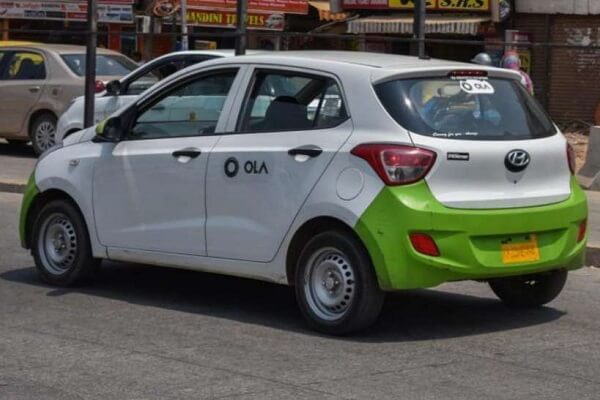 North-South Commuter Railway (NSCR): Modern Train Network Connecting Luzon Island
North-South Commuter Railway (NSCR): Modern Train Network Connecting Luzon Island India launched Bharat Taxi Service as First Cooperative-Owned Digital Mobility Platform
India launched Bharat Taxi Service as First Cooperative-Owned Digital Mobility Platform India places World’s First Live Commercial Order for Hyperloop-Based Cargo Logistics
India places World’s First Live Commercial Order for Hyperloop-Based Cargo Logistics How Weigh-in-Motion Systems Are Revolutionizing Freight Safety
How Weigh-in-Motion Systems Are Revolutionizing Freight Safety Women Powering India’s Electric Mobility Revolution
Women Powering India’s Electric Mobility Revolution Rail Chamber Launched to Strengthen India’s Global Railway Leadership
Rail Chamber Launched to Strengthen India’s Global Railway Leadership Wage and Hour Enforcement Under the Massachusetts Wage Act and Connecticut Labor Standards
Wage and Hour Enforcement Under the Massachusetts Wage Act and Connecticut Labor Standards MRT‑7: Manila’s Northern Metro Lifeline on the Horizon
MRT‑7: Manila’s Northern Metro Lifeline on the Horizon Delhi unveils ambitious Urban Mobility Vision: Luxury Metro Coaches, New Tunnels and Pod Taxi
Delhi unveils ambitious Urban Mobility Vision: Luxury Metro Coaches, New Tunnels and Pod Taxi Qatar approves Saudi Rail Link Agreement, Accelerating Gulf Railway Vision 2030
Qatar approves Saudi Rail Link Agreement, Accelerating Gulf Railway Vision 2030
BMW's Emissions Investigation: What Does It Mean for Drivers?
 Image Credit: Andrei Poenalte | Unsplash
Image Credit: Andrei Poenalte | Unsplash
BMW has maintained a strong reputation for quality throughout much of its history. Today, its standing may be in jeopardy as German authorities investigate an alleged emissions scandal involving its X3 series of SUVs.
Vehicle emissions have undergone increasing scrutiny in many nations as climate concerns have risen. However, the last big scandal was Volkswagen’s infamous “dieselgate” in 2015, when the automaker falsified its emissions data. The lingering impacts of the event lasted for years, raising questions and concerns for BMW drivers amid recent news.
While the investigation is still in its early stages, the past can reveal much about potential future impacts should authorities find BMW guilty.
Inside the Investigation
The BMW investigation began when environmental watchdog group Deutsche Umwelt Hilfe (DUH) first reported the scandal in mid-2023. In their report, DUH noted that 2.0-liter diesel BMW X3s emitted far less nitrous oxides (NOx) with the air conditioning off than in real-world driving conditions. The discrepancy led the organization to believe BMW models used an illegal device to lower emissions in testing environments.
Some automakers have falsified their emissions testing using cheat devices like this. These typically consist of specialized software that manipulates the engine and emissions filters to produce lower NOx levels in laboratory conditions. The vehicle then receives a low-emissions rating to boost sales or pass regulatory inspections despite real-world driving conditions generating dissimilar results.
Lower emissions with the air conditioner off are not unusual. Running the air conditioner requires power from the engine, so turning it off produces fewer tailpipe fumes. However, DUH alleges the drop they noticed with the air conditioning off was much lower than the average decrease.
In January, news broke that Kraftfahrt-Bundesamt (KBA) — the German transportation regulatory agency — is investigating this issue. When the initial DUH report was released, BMW denied using any cheat devices, and KBA has yet to accuse the automaker formally. However, if charges should follow, the reported investigation could impact both BMW and its customers.
Possible Recalls
BMW may have to recall some X3 models if the investigation finds them guilty of emissions tampering. When faced with similar charges, VW responded by retrofitting 400,000-600,000 vehicles with improved catalytic converters and buying back others. Depending on how BMW’s case goes, KBA could require the automaker to do the same.
The BMW case is notably smaller than the 2015 VW scandal. The latter concerned multiple models across several VW-owned brands, while the current investigation only covers 2.0-liter diesel X3s made between 2010 and 2014. Consequently, recalls would affect far fewer drivers, but it would be frustrating and time-consuming for customers.
Like any other recall, X3 drivers wouldn’t necessarily have to surrender their vehicles. However, BMW would be obliged to retrofit them at no cost or reimburse customers if they return their car. Any affected drivers would get their car back in better condition, but it is difficult to say how long they must wait, leaving them without a vehicle for the time being.
Broader Financial Impacts
If KBA presses charges, a recall would only be the beginning of BMW’s concerns. The automaker would also suffer a significant economic toll, as it must cover repairs and upgrades and likely pay costly legal fees. BMW drivers may also feel some of the lingering financial effects.
Most notably, a publicized scandal could impact the resale value of affected BMW models. Depending on the size of the case and the public’s response, the same could apply to all BMWs, not just the X3. People could lose trust in BMW as a brand, making them less likely to buy any vehicle from them, regardless of whether it was part of the investigation.
Drivers who don’t go along with a recall and keep driving higher-emissions vehicles could see higher long-term costs, too. Diesel particulate filters typically last between 150,000-250,000 miles before needing replacement, but higher emissions will result in needing replacement sooner. Failing to change these out can also lead to bigger engine issues, creating additional costs.
On the other hand, some drivers could benefit from legal action. VW paid damages to some drivers and offered cash bonuses to others to lessen the blow of its emissions scandal. BMW could follow suit to conserve its public image if German authorities find it guilty.
The Big Picture
Some potential ripple effects from an environmental investigation will take longer to show. The most prominent are larger market shifts for BMW and its related brands. Depending on the size of the fallout, the automaker may suffer significant losses, driving it to raise new vehicle prices.
Price shifts like this could impact Mini and Rolls-Royce, also part of the BMW group. These are already luxury brands, so higher costs could make some high-end vehicles less accessible. It’s worth noting that prices may also rise not to compensate for legal fees but to ensure higher real-world emissions standards, which require more complex manufacturing.
As emissions regulations become increasingly common and stringent, such a scandal may also affect the electric vehicle (EV) market. Uncertainty about the price and resale value of fossil fuel cars could push more consumers toward EV alternatives. In the wake of the investigation, BMW may even lean into EV production to create a more sustainable image.
This shift could lead to lower EV prices or more options as BMW moves its focus away from fossil fuels. By the same token, though, the decline of gas and diesel vehicles may accelerate. Some car enthusiasts could find the trend at odds with their goals or hobbies, leading to dissatisfaction with the brand.
The Impact Remains Uncertain
The result of KBA’s investigation into BMW is still uncertain regarding the likelihood of legal action and its consequences for drivers. Even if BMW emerges unscathed legally, the scandal may still cause faith in the brand to waver. BMW drivers and enthusiasts should closely monitor how the case progresses to anticipate these changes.
As regulations rise, cases like this may become more common. How bumpy that transition will be for consumers depends on how automakers manage and prevent these incidents.






